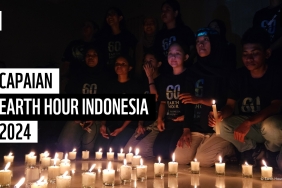EVERY HOUR IS EARTH HOUR” IN BA’KELALAN
Ba’Kelalan, Lawas, SARAWAK - Earth Hour draws the world's attention to the fact that many of us have to drastically reduce our ecological footprint if we are to achieve a sustainable lifestyle. But we must not forget that whilst some might be using several times their 'fair share' of resources, others are living on just a fraction of what they might be entitled to.
To the people of Ba'Kelalan in the highlands of Sarawak, every hour is 'Earth Hour'. Like many other indigenous communities across the Heart of Borneo, the people of Ba'Kelalan use a mixture of hydropower, solar and evening-time generators to generate power. They farm the land using traditional, sustainable methods and they conserve the forests that provide the ecosystem services they rely on.
The result is an environment and an environmental footprint that is the envy of many – cool, fresh air fills the forests; clean, unpolluted streams flow from the mountains, organic paddy fields are scattered amongst the valleys. The people of Ba'Kelalan are both a thriving, developing community and an example of how to live within the limits of the environment.
Leading by example, the Ba’Kelalan community decided to join in the celebration of Earth Hour on 29th March with communities across the world. They turned off their generator-lit lights, and used candles instead for the Earth Hour 8:30-9:30pm. To enhance the festive spirit they staged dance and music performances throughout the evening. It was a lively evening celebration in a clean, fresh highland environment.
Joining in the celebration in Malaysia were local chair of the Alliance of the Indigenous Peoples of the Highlands of Borneo (FORMADAT), Penghulu Sigar Sultan, together with WWF representatives and invited guests.
WWF's Leader for the Heart of Borneo, Thomas Maddox and WWF-Malaysia Policy Manager, Jason Hon, gave talks on the importance of green living and pledged WWF's continuing support to the people of the Borneo highlands to help them maintain their traditions of sustainable development.
”One planet living requires many of us to drastically reduce consumption,” said Maddox. ""In Ba'Kelalan your relationship with your environment is an example to us all.""
“Continue to engage in traditional farming methods in the highlands; always be aware of the importance and need to safeguard the environment and stop its degradation,” Hon urged the community.
Cristina Eghenter of WWF-Indonesia Social Development Strategy Leader emphasized that, “We need to work towards ensuring a more fair share of energy between rural and urban areas, while also encouraging more sustainable lifestyle.”
Earth Hour is a global environmental initiative that began in 2007 in Sydney Australia when 2.2 million individuals and more than 2,000 businesses switched off their lights for one hour from 8.30pm, to take a stand against climate change. In 2014, Earth Hour was celebrated on 29 March.



